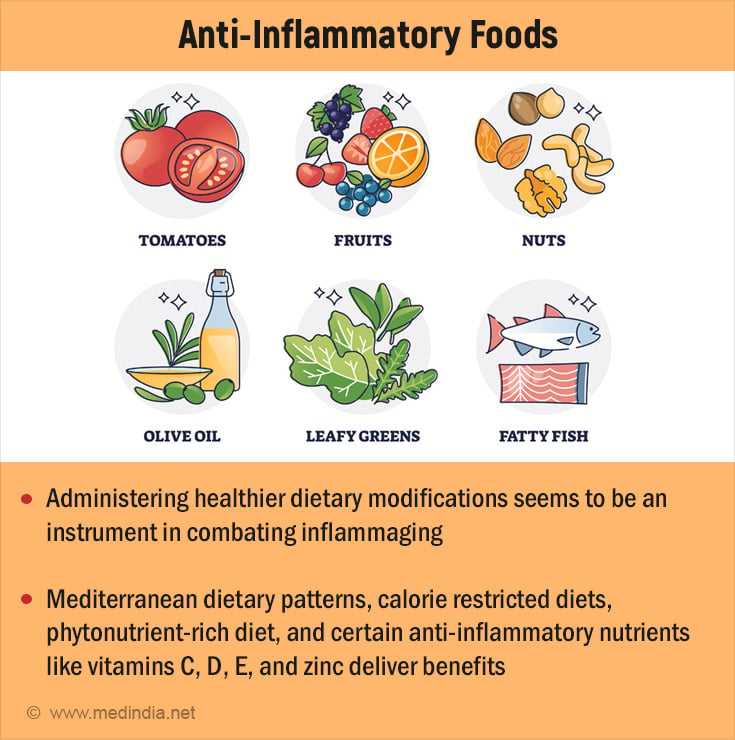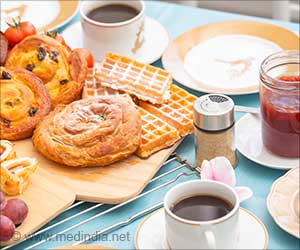- Nutrition and Diabetes in the Context of Inflammaging - (https://link.springer.com/article/10.1007/s13670-020-00338-2)
- The role of nutrition in inflammaging - (https://www.sciencedirect.com/science/article/abs/pii/S1568163722000381?via%3Dihub)
- An Update on Inflamm-Aging: Mechanisms, Prevention, and Treatment - (https://www.hindawi.com/journals/jir/2016/8426874/)
- Inflammageing and metaflammation: The yin and yang of type 2 diabetes - (https://www.sciencedirect.com/science/article/abs/pii/S1568163717301782?via%3Dihub)
- Inflammaging as a target for healthy ageing - (https://academic.oup.com/ageing/article/52/2/afac328/7024516)
- From inflammaging to healthy aging by dietary lifestyle choices: is epigenetics the key to personalized nutrition? - (https://clinicalepigeneticsjournal.biomedcentral.com/articles/10.1186/s13148-015-0068-2)
- Inflammaging and Cancer: A Challenge for the Mediterranean Diet - (https://www.mdpi.com/2072-6643/7/4/2589)
What is Inflammaging?
Low-grade, chronic inflammation intertwined with physiological aging and immunosenescence (aging of the immune system) is called inflammaging. Diet holds a prime position in influencing and counteracting inflammaging. Inflammation that originates outside the immune system such as in the adipose tissues and gut environment may trigger inflammaging and it may contribute to different age-related diseases. Inflammaging also acts as a determinant of the speed of aging. It may decline the quality of life and increase the morbidity and mortality of individuals.
Franceschi et al. gave the first definition of inflammaging. They defined it as an aging process that was connected with a progressive rise in proinflammatory status and a reduced capability to handle stress(1✔ ✔Trusted Source
Nutrition and Diabetes in the Context of Inflammaging
Go to source, 2✔ ✔Trusted Source
The role of nutrition in inflammaging
Go to source).
Impact of Inflammaging
A dynamic balance between the network of proinflammatory and anti-inflammatory cytokines maintains optimal physiological functioning. Inflammaging is intensively associated with atherosclerosis, heart disease, Alzheimer's disease, Parkinson's disease, multiple sclerosis, osteoporosis, age-related macular degeneration, diabetes, and cancer.
Large cohort studies showed serum levels of interleukin-6 (IL-6) to be a reliable marker of inflammaging. Elevated inflammatory status may stimulate insulin resistance and consequently raise the risk bar for type 2 diabetes by interfering with insulin signal transduction. Cytokines and chemokines like IL-6 and monocyte-chemoattractant protein 1 (MCP-1) are linked with diabetes development. Proinflammatory molecules may even lead to beta-cell deterioration. Among obese individuals, adipose tissue is regarded as the main source of low-grade inflammation(3✔ ✔Trusted Source
An Update on Inflamm-Aging: Mechanisms, Prevention, and Treatment
Go to source, 4✔ ✔Trusted Source
Inflammageing and metaflammation: The yin and yang of type 2 diabetes
Go to source).
Potential Contributors
Multiple factors have been shown to catalyze inflammaging. To point out a few:
- Accumulation of senescent cells
- Oxidative stress
- Antigen stressors
- Physical inactivity
- Gut microbiota dysbiosis
- Increased central adiposity
- High-fat diet and
- High consumption of refined foods(5✔ ✔Trusted Source
Inflammaging as a target for healthy ageing
Go to source).
What's the Connection with Diet?
Inflammation and nutrition exhibit close associations. Dietary habits that may include the type of foods consumed, the presence of nutrients, and bioactive compounds have been shown to influence the signaling pathways of inflammation. Environmental factors like pollution, genetics, and stress are also known to play a major role. Plant-derived phytochemicals, macronutrients and micronutrients regulate oxidative stress, metabolic pathways and inflammatory signaling. Various studies have depicted the clear epigenetic changes in response to unhealthy diets and have contributed to the development and progression of inflammaging diseases(6✔ ✔Trusted Source
From inflammaging to healthy aging by dietary lifestyle choices: is epigenetics the key to personalized nutrition?
Go to source).
Nutrition and Inflammaging
Nutrition-based management of inflammaging has gained great interest in achieving healthy aging. Administering healthier dietary modifications that deviates from western diets may seem instrumental. A diet that provides an appropriate balance of energy, essential micronutrients, adequate macronutrients, and hydration will support in escaping inflammaging. The nutritional status of the elderly may miss the mark, paving the way for inflammation. Hence, adhering to a healthy diet plays a major role in turning down inflammation-related disease development.
- Calorie restriction along with sufficient nutrient intake, has shown benefits in counteracting aging. The anti-aging property of calorie restriction helps in suppressing oxidative stress related diseases. It also modulates inflammatory signalling pathways and abates inflammaging.
- Mediterranean diet that includes whole grains, proteins, low-fat dairy products, fish, nuts, fruits and vegetables displayed effectiveness in reducing the hallmarks of inflammaging such as C-reactive protein and Tumor Necrosis Factor-α (TNF-α).Chronic inflammation in inflammaging has shown a correlation with cancer risk. The bioactive nutrients in the Mediterranean diet helps to modify multiple processes associated with carcinogenesis and inflammation.

- Phytochemicals derived from green tea, fruits, vegetables, turmericand more mitigate inflammaging by the following mechanisms: attenuation of stress signaling; blocking pro-inflammatory cytokines; enhanced expression of antioxidant proteins; blocking transcription factors associated with the metabolic disease; and activation of factors that antagonize inflammation.
- Curcumin, resveratrol, genistein and epigallocatechin gallate have shown inhibitions against inflammation. Resveratrol has been shown to hold back tumorigenesis and the upregulation of proinflammatory molecules(2✔ ✔Trusted Source
The role of nutrition in inflammaging
Go to source, 3✔ ✔Trusted Source
An Update on Inflamm-Aging: Mechanisms, Prevention, and Treatment
Go to source, 6✔ ✔Trusted Source
From inflammaging to healthy aging by dietary lifestyle choices: is epigenetics the key to personalized nutrition?
Go to source, 7✔ ✔Trusted Source
Inflammaging and Cancer: A Challenge for the Mediterranean Diet
Go to source). Specific nutrients have played significant roles in turning down inflammaging. One such nutrient is omega-3 polyunsaturated fatty acids (alpha-linolenic acid, eicosapentaenoic acid, and docosahexaenoic acid) found in fatty fish, nuts, and olive oil may resolve inflammation. Zinc and vitamin C hold immune-enhancing and inflammation-reducing properties,thereby delaying inflammaging. Foods like almonds, walnuts, dark chocolate, shellfish, eggs, and seeds are rich in zinc. Vitamin C rich foods like amla, sweet lime, oranges, kiwi, bell peppers, and sprouts should be included in the diet to battle inflammation. Vitamin D and E supplementation have also been shown to be effective in inhibiting cytokine production, and oxidative stress. Vitamin E containing foods like plant-based oils, avocado, nuts, and seeds, and vitamin D fortified milk, yogurt, fruit juices, and cereals should be considered in the diet as well(5✔ ✔Trusted Source
Inflammaging as a target for healthy ageing
Go to source).
Microbiome and Inflammaging
The composition and diversity of the microbiota manipulate an individual’s inflammatory status, aging and hence inflammaging. Growing evidence claims that microbial dysbiosis and intestinal integrity facilitate inflammaging. The gastrointestinal tract plays significant roles in regulating several physiological processes that may include immunological tolerance to foods. Studies have shown that alterations in the gut can negatively influence immunity and thereby raise the risk of inflammation.
Probiotics are recognized as a good choice to exhibit anti-inflammatory actions by increasing the production of short-chain fatty acids (SCFA), reducing the production of pro-inflammatory cytokines, and enhancing gut barrier function.
Prebiotics such as insulin and galacto-oligosaccharides help boost the growth of commensal gut bacteria. When administered along with probiotics, they exhibit powerful anti-inflammatory properties(2✔ ✔Trusted Source
The role of nutrition in inflammaging
Go to source, 5✔ ✔Trusted Source
Inflammaging as a target for healthy ageing
Go to source).
Final Note
Lifestyle-based interventions and non-pharmacological approaches such as a healthy diet, phytochemicals or nutraceutical supplementation, microbiome-based remedies, and physical activity gleam anti-inflammaging actions. Nutrients like vitamins C, D, and E, omega-3 fatty acids, zinc, and several phytonutrients have excellent anti-inflammatory properties. Incorporating a health-promoting lifestyle and making the right food choices sculpts good health and longevity.











